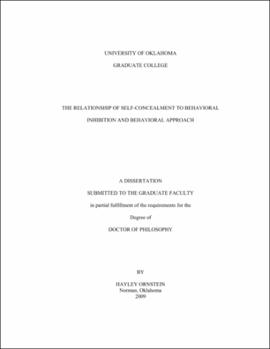| dc.description.abstract | This research examines self-concealment, or the tendency to keep negative information about oneself secret. It reviews research on self-concealment and its positive association to physical and psychological complaints. Theories that claim self-concealment causes these negative symptoms are called into question. An alternative theory is presented, which suggests that the personality of self-concealers, rather than secret-keeping, per se, primarily contributes to their negative symptomatology (Kelly & Yip, 2006). This study investigates the relationship between self-concealment and behavioral inhibition, a construct previously suggested as responsible for the association between self-concealment and negative symptomatology (Kelly, 2002; Larson & Chastain, 1990). This author also investigates the relationship between self-concealment and behavioral approach. The Self-Concealment Scale (SCS; Larson & Chastain, 1990) and the Behavioral Inhibition/Behavioral Activation Scales (BIS/BAS; Carver & White, 1994) are used to investigate these questions with a nonclinical adult sample. Multiple regression analysis revealed that behavioral inhibition significantly predicated self-concealment for women and men. Among men Fun Seeking, a facet of behavioral approach associated with impulsivity, positively predicted self-concealment; and Reward Responsiveness, a facet of behavioral approach associated with movement toward and positive emotion with reward, negatively predicted self-concealment. These results shed light on the relationship of self concealment to behavioral inhibition and behavioral approach and gender differences in self-concealment. | |
